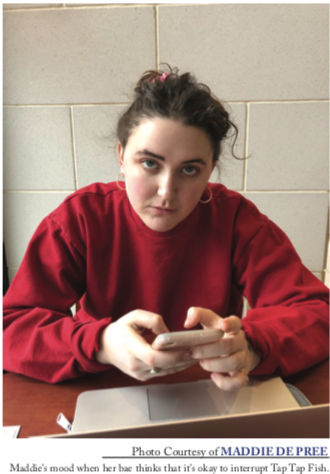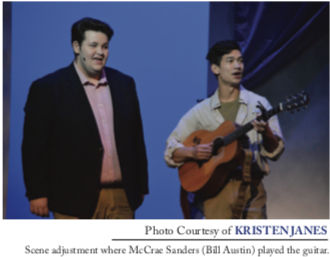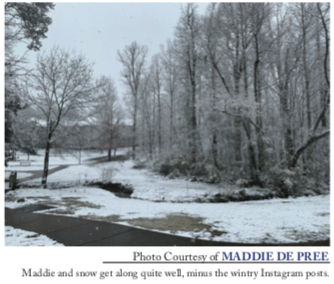The fire alarm shrieks. You check your phone: 3:10 a.m. You utter something unprintable, roll out of bed, and shuffle to the door to be greeted once again by the smell of burnt popcorn.
I know this drill well. As an upperclassman, it’s rote recitation. Hear of a fire on campus started by anything other than popcorn and my ears perk up. By now, I’m beyond annoyed: I’m intrigued. Is it always popcorn?
I walk into FUPO’s office and am greeted by Nila Porter, the office Communications Coordinator. I tell her the why of my visit, stopping short at “fires on campus.”
“What, popcorn and microwaves?” says Officer-in-Training David Tedrow who had just stopped by Mrs. Porter’s desk.
I smile. “Yes, actually.” We share a laugh. Lucky enough for me, two people I’m looking for happen to be standing on the McAlister
stage. I pop over to ask a few questions and set up an interview. Turns out, I’m not alone in my popcorn prejudice. “But, we’ll go into that during the interview,” says Furman’s Fire Safety Specialist, Joe Surber, while Bernie Stanton, Director of Risk Management, nods in agreement.
I arrive at Facilities Services later that week to find Joe in his office reprogramming a dummy alarm system harvested from storage beneath the PAC. Joe’s program, a 30-second hold on alarm transmission under continuous alarm levels of smoke-like air particulate, is a stopgapmeasure currently implemented in the North Village to avoid false alarms, many of which are indeed popcorn related. Bernie says: “We’re thinking about alarms that may be real some day that aren’t taken seriously because of the popcorn.”
I ask as to the statistics regarding the popping pest and Joe quickly prints a sheet of data recorded August 2011 to February 2012 following the new alarm programming. (His recent volume of work has delayed updated information.) I am surprised (and not surprised) by what I see next to five of the fifteen primary incidents: “CAUSE: BURNT POPCORN.” Joe’s implementation eliminated 68% of false alarms in the North Village during the six-month timeframe – a definite success. There is more to be done, however.
Residence halls do not have the 30-second delay in place, due to restraints stipulated by Furman’s contractual fire brigade, the Duncan Chapel Fire Department (DCFD). DFCD requires that, in order for the 30-second delay to be permissible, the designated area must be “sprinkled.” This poses a problem for older residence halls constructed during times when fire codes were more lax and sprinkler systems less universal.
Joe and Bernie are in a hard place, having to balance opposing wants. “Parents are probably gonna say, ‘Man, if somebody just burps…’ while students are saying, ‘Come on, let’s be realistic. I live here.’” Yes, the 30-second delay leaves more room for hazard; however, a far greater hazard is possible.
Such sensitive systems have led to a dangerously desensitized student body. Joe says, “The first thing I hear [when the alarm goes off] is a whole bunch of cursing… Someone’s messed up, somebody did something wrong.” He adds, “There’s your risk.
You keep lowering the vigilance threshold.” In the case of fire alarms that cry wolf, apathy could yield to tragedy when the real wolf comes to huff and puff – something which even the DCFD’s quickest response could not prevent.
Curious to hear from the people who have to do a lot more than simply roll out of bed when the alarm goes off, I took a trip to the DCFD station on Old Buncombe Road. After a push of the buzzer, the door opens and I am let in by Lieutenant Hall, a career fireman with DCFD for more than 11 years. The entrance hall leads to a kitchen and common area. On one of the walls is a cork board lined with DCFD’s extensive collection of fire department patches.Morse Code beeps in rapid succession on the P.A. system, interrupted by brief dispatches ending in “10-4.” By this point, I’m feeling pretty cool.
DCFD deals with much more than popcorn on Furman’s campus, I find out. Animal control, alcohol overdose, anaphylactic shock, bike accidents, and downed trees are a few of the things they handle. In respect of their ongoing relationship with Furman, the station did not wish to comment directly; however, the overall message was, though suiting up in 60 Lbs. of stifling equipment at three in the morning is no delight: “The [smoke detectors] are doing their job.” Their wish for Furman is that students be more careful in the kitchen and elsewhere.
When swamped with work, a thousand time commitments, and anxieties over what the grown-ups call “a future,” our brains tend to push little things like, “Hey, you should probably watch the microwave” to the back burner. Ben Coullie, a junior from South Africa, proved no different one night.
Looking to add a tasty extra to his movie experience, Ben placed a bag in C-108’s microwave, punched in the allotted time, and beat a hasty retreat back to his room. “In South Africa, our microwaves are much less hectic than they are here,” he explained. You can guess what happened next.
Two minutes and 40 seconds later, the apartment microwave had become Mt. Vesuvius in miniature. Ben’s “digs mate” Greg Gaydos, senior Chemistry and Asian Studies double, happened to be catching a Steelers pre-season game in the living room and noticed a familiar smell just in time. Lucky enough for Ben and DCFD, Greg’s quick thinking prevented a visit from the big red trucks.
Ben isn’t entirely to blame, though. When directions speak of potential four minute cook times, we expect that a quick Facebook check-up or loo rendezvous should fall well within the popping prescription. Furman’s “hectic” heaters prove a little different, however.
I open the door to C-108’s dielectric radiator and look at its stats. Ben talked of 900 watt microwaves in South Africa: Our General Electric® Sensor Microwave Oven’s size up at 1,650 W (and we’re not even in Texas). I decide to do a test drive on the patio with a bag of Homestyle – “with a sprinkle of salt and a taste of butter.” Two minutes and 16 seconds later, I smell smoke, grab the sucker, and sink it in a bowl of water by my side. It takes 15 seconds to completely subdue the billowing bag. By now, I’m feeling pretty perplexed.
There are a lot of fingers pointing here, and they’re all pointing in the right direction. Smoke detectors should be less sensitive, students should be more sensitive, and housing should be more proactive. Maybe, we need ionizing smoke detectors as opposed to the current optical detectors, which cannot differentiate between smoke and hair-straightener steam. Maybe, we need flyers and less powerful microwaves, instead of Duke Nukem’s play-pals.
Perhaps it is something entirely different. Maybe, the secret solution is tucked between a few bullet points on the side of a box of microwavable popcorn.







































